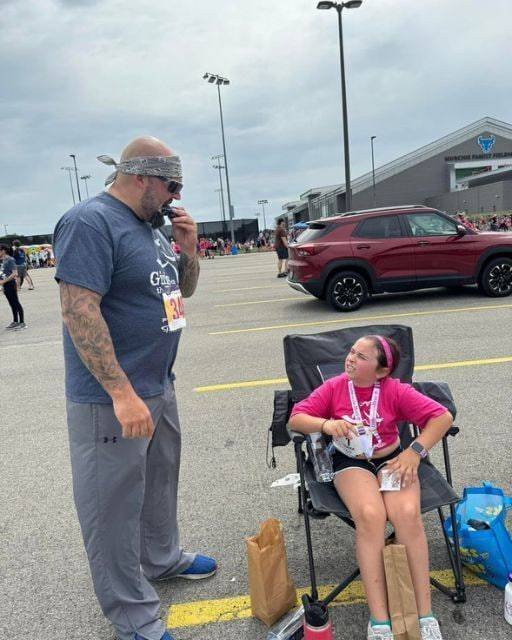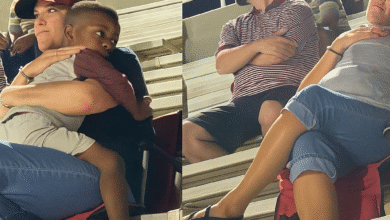I THOUGHT HE WAS JUST MY COACH — UNTIL I OVERHEARD WHAT HE SAID ABOUT ME.

I was exhausted after the race. My legs felt like jelly, and I was pretty sure I still had half a granola bar lodged in my throat. It was only a 5K, but I collapsed into the folding chair like I’d just finished a marathon.
Coach Tate came over, panting, sweat dripping down his tattooed arm. He always looked a little intimidating—like the kind of guy who used to be a nightclub bouncer or rides a motorcycle with no helmet. But today, he was wearing the same race shirt as us—Girls on the Run—though his barely fit over his biceps.

He handed me a bottle of water and a crumpled brown paper bag with my name scribbled on it.
“Good run, Mia,” he said, ruffling my hair. “You pushed through the pain. I’m proud of you.”
I rolled my eyes, trying to seem chill. But honestly? It meant something.
A few minutes later, while I was digging through the bag for the cookie I knew he’d snuck in, I heard him talking to one of the race volunteers behind me.
“I don’t care what her file says,” he said. “That girl’s got fight. I see it every time she doubts herself but keeps going anyway.”
I froze.
Because I knew exactly what file he meant.
And the stuff in there wasn’t supposed to leave the office.
What he said next made my chest tighten—and it’s the reason I haven’t told my mom what really happened during the last mile.
Coach Tate wasn’t talking about race stats or push-up counts. He was talking about something more personal—something few people knew about. A year ago, I was diagnosed with dyslexia, and school had started to feel like a mountain I couldn’t climb. Just writing my name on the board made my hands shake, reading assignments overwhelmed me, and exams felt like torture. The guidance counselor had documented it all—my struggles, my tears, and the long conversations about whether I should drop down to easier classes.
That file? It wasn’t just about academics. It was titled “Mia: Potential Challenges.” It reflected all the doubts people had about whether I could handle anything hard.
But Coach Tate didn’t agree.
“She doesn’t need people telling her she can’t,” he told the volunteer. His voice lowered, but I leaned in, listening hard. “Her strength doesn’t fit in words. Just watch—she’ll prove everyone wrong.”
No one had ever talked about me like that before. My cheeks burned. Like I was more than my struggles. Like I could be something.
I couldn’t stop thinking about it. Why did Coach Tate have my file? Why did he believe in me so much when I didn’t even believe in myself?
After the race, I avoided him. I took my medal (which felt weirdly heavy) and mumbled something about looking for my mom. She was standing by the car, scrolling through her phone, unaware of everything churning inside me.
“Hey, champ!” she said, opening her arms for a hug. “How’d it go?”
“Fine,” I shrugged, stuffing the medal into my bag. I couldn’t meet her eyes. Not yet.
She raised an eyebrow.
“Just fine? You trained for months.”
I kicked a rock.
“It was fine.” Then I added, quietly, “I almost quit halfway through.”
Her expression softened.
“Oh honey. Did something happen?”
I quickly shook my head. I wasn’t going to tell her. If she knew, she’d start questioning Coach Tate—wondering how he saw the file. And then everything would get complicated. My mom hated when people treated me differently because of my dyslexia. She always said, “Pity is poison.”
So I faked a smile.
“No. Just tired.”
The next practice was awkward. I kept watching Coach Tate, wondering if he’d bring up what I’d overheard or the file. But he acted like normal. Too normal. He joked with the girls, encouraged us during drills, passed out water like always.
Until the very end.
While we were stretching under the fading light, he told me to hang back. My stomach twisted. Was he going to confront me for eavesdropping? How did he know so much about me?
But instead, he sat down in the grass next to me and pulled out a small notebook.
“Ever heard of journaling?” he asked casually.
“Nope,” I replied suspiciously. “Sounds like something poets do.”
He chuckled.
“Not always. Sometimes warriors do it too. People who need to untangle what’s in their head.”
I frowned. What did that have to do with me?
He opened the notebook to a messy handwritten page.
“This one’s mine. I write when life gets heavy. Good days, bad days, things I’m learning. Helps me get some perspective.”
I looked at the page. It was messy—smudged ink, crossed-out words, misspellings. But it didn’t matter. He wrote anyway. That was what counted.
“I’m not good at writing,” I whispered. “It takes me forever.”
“That’s okay,” he said. “No one’s grading you. Just try. One sentence a day. Write about your runs, your wins, your frustrations—anything.”
He handed me the notebook and stood up.
“Start tomorrow. See what happens.”
At first, journaling felt silly. Who wants to write about feelings on purpose? But after a week, I realized it wasn’t about being perfect. It was about being honest. I wrote about how hard it was to run. About getting my left and right mixed up during drills. About how mad I felt when people assumed I couldn’t do something because of my dyslexia.
And slowly, something shifted. Writing helped me process—not just running, but school too. When math problems overwhelmed me or reading assignments felt like mountains, I remembered Coach Tate’s lesson on the track: progress isn’t always fast, but it’s still progress.
One night, after practice, I got the courage to ask about the file. We were alone on the field, the sky glowing orange and pink.
“How did you know I have dyslexia?” I asked.
He leaned against the fence.
“Your mom told me.”
“What?” I gasped. “She swore she wouldn’t!”
“She didn’t mean to betray your trust,” he said gently. “She wanted me to know so I could support you. Quietly. Without judgment.”
I blinked, letting that settle. My mom trusted him to help me, not to expose me. And he had. In his rough, strange way, he had.
“Why do you care so much?” I asked quietly.
He scratched his neck and smiled.
“Let’s just say I’ve been there. Labels stick. And if you let them, they define you.”
For months, I kept pushing myself—not just in running, but in everything. I started placing in races. I raised my hand more in class, even when the answer took me longer to find.
At the second-to-last practice of the season, Coach Tate pulled me aside again. He handed me a brand-new notebook.
“You earned this,” he said. “Keep fighting—for you, not for them.”
Tears welled in my eyes, but I nodded.
“Thanks, Coach.”
Now I know Coach Tate didn’t just teach me how to run. He taught me how to believe in myself—even when the world doesn’t. Life throws obstacles our way, but how we respond is what shapes us.
Even with dyslexia. Even with fear. Even with failure. We’re stronger than we think.
And if you’ve made it this far, I challenge you: find your own way to journal. Your own way to clear the noise and focus on what matters.
Trust me—it makes all the difference.





